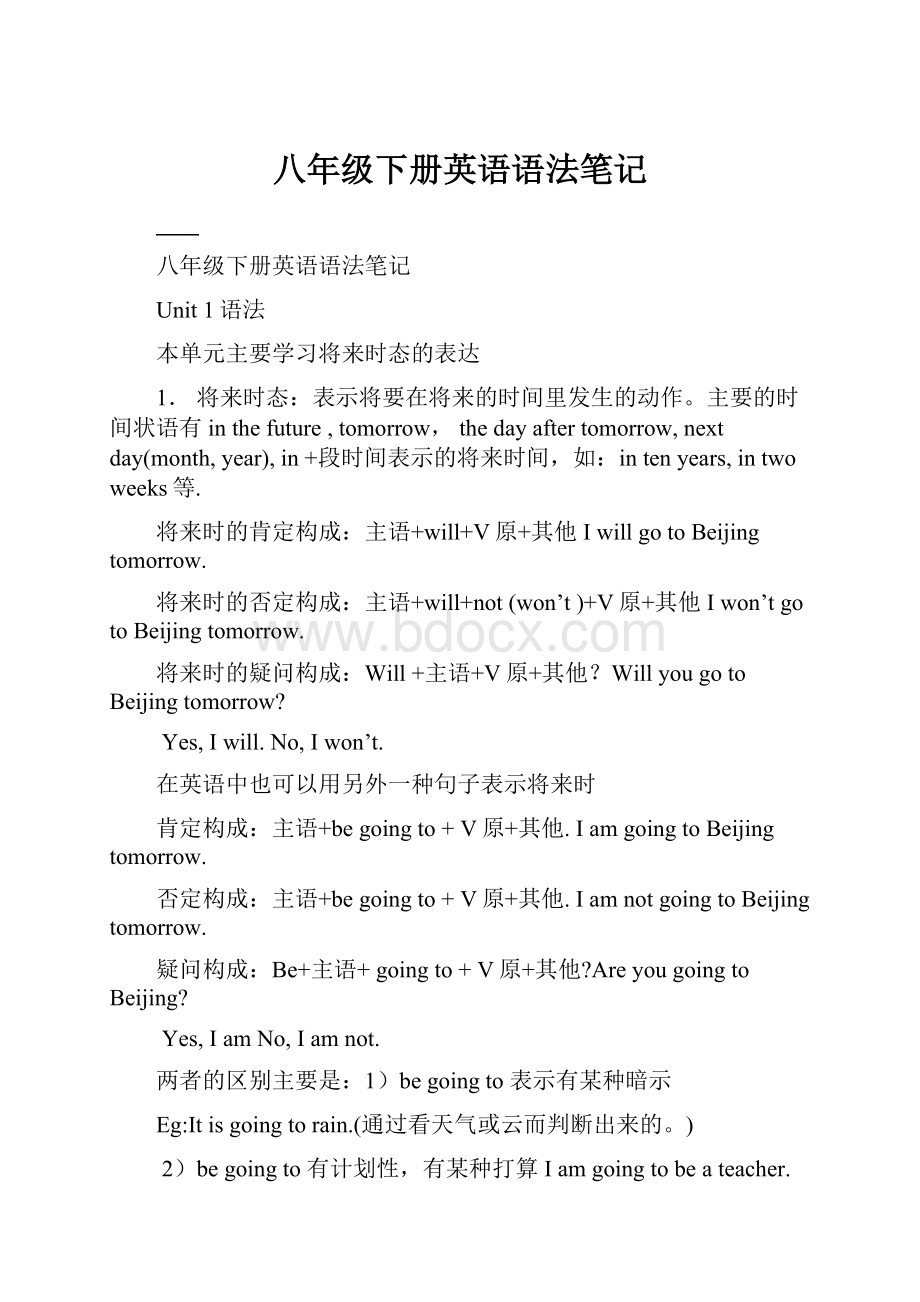八年级下册英语语法笔记.docx
《八年级下册英语语法笔记.docx》由会员分享,可在线阅读,更多相关《八年级下册英语语法笔记.docx(30页珍藏版)》请在冰豆网上搜索。

八年级下册英语语法笔记
八年级下册英语语法笔记
Unit1语法
本单元主要学习将来时态的表达
1.将来时态:
表示将要在将来的时间里发生的动作。
主要的时间状语有inthefuture,tomorrow,thedayaftertomorrow,nextday(month,year),in+段时间表示的将来时间,如:
intenyears,intwoweeks等.
将来时的肯定构成:
主语+will+V原+其他IwillgotoBeijingtomorrow.
将来时的否定构成:
主语+will+not(won’t)+V原+其他Iwon’tgotoBeijingtomorrow.
将来时的疑问构成:
Will+主语+V原+其他?
WillyougotoBeijingtomorrow?
Yes,Iwill.No,Iwon’t.
在英语中也可以用另外一种句子表示将来时
肯定构成:
主语+begoingto+V原+其他.IamgoingtoBeijingtomorrow.
否定构成:
主语+begoingto+V原+其他.IamnotgoingtoBeijingtomorrow.
疑问构成:
Be+主语+goingto+V原+其他?
AreyougoingtoBeijing?
Yes,IamNo,Iamnot.
两者的区别主要是:
1)begoingto表示有某种暗示
Eg:
Itisgoingtorain.(通过看天气或云而判断出来的。
)
2)begoingto有计划性,有某种打算Iamgoingtobeateacher.
除了以上之外,will和begoingto可以通用。
2.Therebe句型表示“有”,have也表示“有”,那么“将要有”的表达如下:
1Thereisgoingtobe②therewillbe
③主语(必须是人做主语)+willhave④主语(必须是人做主语)+begoingtohave
Thereisgoingtobeasportsmeetingnextweek.
=Therewillbeasportsmeetingnextweek.
Iwillhaveanewtoycar.=Iamgoingtohaveatoycar.
没有thereisgoingtohave,therewillhave的表达。
3.不定代词:
表示没有具体指代的人或物。
表示物的不定代词everything,something,anything,nothing
不定代词
表示人的不定代词everybody(everyone),somebody(someone),
anybody(anyone),nobody(noone)
注意:
所有的不定代词没有复数形式,只有单数形式。
Everyonestays(stay)athome.
4.alittle,little,afew,few的区别及用法
alittle一点afew
后面必须加不可数名词后面必须加不可数名词
little几乎没有alittle
eg:
Heisnew,sohehasfewfriends.
eg:
Iamsothirsty,butthereislittlewaterintheglass.
little—less—leastfew—fewer—fewest
5.free自由的adjIwillbefreetomorrow.
免费的adjEverythingisfree,youneedn’ttakemoney.
n.freedom自由
6.polution污染n.(不可数名词)Thereismuchpollutioninthecity.
7.agree:
v同意agreewithsb.同意某人Iagreewithyou.
agree—disagree=don’tagree
在SectionA中必须掌握的短语
1therewillbe将要有②inpeople’shomes在人们的家里
③studyathomeoncomputers在家通过电脑学习
④befree免费⑤livetobe…活到…⑥in100years一百年以后⑦lesspollution更少的污染
⑧bigandcrowded大而拥挤⑨moretallbuildings更多的高大建筑物
8.alone,lonely
alone,独自一人强调一个人lonely,孤独的;寂寞的强调内心的孤独,寂寞
Ilivealone,butIdon’tfeellonely.
9.keep:
v.饲养Ilikekeepingpets.
v.使某人…keep(sb.)doingsthIkeephimwaiting.
保持keepsth+adjPleasekeeptheroomclean.Keepquiet.
10.can/beableto区别
共同点:
含义相同能够
不同点:
can是情态动词,只有一般现在时态和过去时态
beableto可用于各种时态,be动词随主语的不同要做相应的变化。
Hecanplaysoccer.=Heisabletoplaysoccer.
11.need:
双重身份的动词1)情态动词+V原Ineedanewbike.
2)行为动词needtodosthIneedtobuyanewbike.
12.Predictingthefuturecanbedifficult.Predicting在这里是动名词做主语。
动名词虽然是名词,但是也具有动词性质,表示动作,但是名词就没有动作性质。
predictv预测n.predictionn.预测,预言
13.Oneof+名词复数+动词单数+其他….的之一
Heisoneofthebeststudents.他是最好的学生之一。
14.beusedby被用于….Thebikeisusedbyriding.
15.seesbdoingsth看见某人正在做某事Iseehimplayingsoccer.
seesbdosth看见某人做了某事Isawhimplaysoccer.
在SectionB中必须掌握的短语
①fellinlovewith爱上②asareporter作为一个记者③livingalone独自一人居住
④ontheweekend在周末⑤oneday一天⑥WorldCup世界杯⑦forfun为了娱乐
⑧fromnow从现在⑨workforsb为某人工作⑩jobinterview工作面试⑾flyto飞向…
⑿cometrue实现
16.help:
helpsbdosth=helpsbwithdoingsth=helpsbwithsth
Hehelpsmecleantheroom.=Hehelpsmewithcleaningtheroom.
17.such\so表示“如此”时的区别
sucha\an+adj.+单数名词Heissuchacleverboy.
so+adj.+a\an+单数名词=Heissocleveraboy.
18.trytrytodosth努力做某事Itrytolistenhimcarefully.
trydoing尝试做某事
tryone’sbesttodosth尽某人最大努力做某事
Itrymybesttohelpher.我尽我最大努力帮助她。
19.thesame…..as同…一样Hehasthesamepenasme.
(注意same前面的the永远不可以丢掉。
)
20.makevmakesbdosth使某人做某事Playinggamesmakemebehappy.
makesb+adj使某人….=Playinggamesmakemehappy.
21.Itis+adjforsb.todosth.对于某人来说做某事是adj.
Itisimportantforustobehealthy.
Itiseasyforachildtowakeup.
22.seem:
v.似乎1)seemtodosthHeseemstobewrong.
2)Itseems(seemed)that+….Itseemsthatheiswrong.
23.overandoveragain再三地Theydosimplejobsoverandoveragain.
Unit2语法
本单元主要学习表示建议的句子
1.should情态动词肯定形式:
主语+should+动词原形
否定形式:
主语+should+not+动词原形
疑问形式:
Should+主语+动词原形?
Yes,主语+should.No,主语+shouldn’t.
2.want:
wanttodosth.wantsb.todosthwant+n.
3.enough:
adj.足够的enough+n.或n.+enoughIhaveenoughmoney.=Ihavemoneyenough.
adv.足够地adj.+enough(切记enough修饰形容词只能放在后面)
Heisoldenough.
enough+n.todosth/adj+enoughtodosth
Eg:
Ihaveenoughbookstoread.Heisoldenoughtogotoschool.
4.arguev.争吵arguewithsb.和某人争吵Healwaysargueswithhisfriends.
argueaboutsth争吵某事Theyarearguingaboutthemathtest.
n.argumentTheyhadabigargument.
5.outofstyle过时的=old-fashionedMyclothesareoutofstyle.
不过时的instyle
6.What’swrong?
怎么了?
=What’sthematter?
=What’sthetrouble?
7.writehimaletter给他写一封信=writealettertohim
8.callsbup给某人打电话Pleasecallmeupwhenyouarefree.
callsbat+电话号码Pleasecallherat88171858.
9.givehimatickettoaballgame给他一张球赛的票
注意这里的介词用to,类似的搭配还有:
theanswertothequestion,thekeytothedoor.
10.surprise:
n.惊讶toone’ssurprise使某人惊讶的是Tomysurprise,hepassedthemathtest.
insurprise惊讶地Helookedatmeinsurprise.
v.surpriseatsth对…感到惊讶Hesurprisedatthetoycar.
surprisesb使某人惊讶Idon’twanttosurprisehim.
adj.surprising(主语是物)/surprised(主语是人)
11.talkaboutsth谈论某事talkto\withsb.和某人谈话
12.1)payfor支付;花费(金钱)
主语必须是人spend....(in)doingsth
2)spend:
花费(时间或金钱)
主语必须是人spend….onsth
3)cost:
花费(时间或金钱)主语必须是物
4)take:
花费(时间或金钱)
只能用it做主语,公式是:
Ittakes(took)sb.sometime(money)todosth.
用口诀记住四个表示“花费”的单词:
2人1物1it.
①Ipaidtenyuanforthebook.
②Ispenttenyuaninbuyingthebook.\Ispenttenyuanonthebook
我花10元钱买了这本书。
③Thebookcostmetenyuan.
④Ittookmetenyuantobuythebook.
13.borrowsth.fromsb.从某人借某物(强调主语向里面借)Heborrowedthebookfromhisfriend.
lendsthtosb.向某人借某物(强调主语向外面借)Helendedthebooktohisfriend.
14.either:
也,放在否定句的末尾,用逗号隔开。
Hedoesn’thaveanymoney,either.
任一的,当either做主语时动词要用单数形式。
Eitheroftheanswerisright.
15.ask:
1)要asksb.forsth.向某人要某物Heaskedhisparentsforthemoney.
2)问askthequestions问问题asktheteacher问老师
asksbaboutsth问某人关于某事
Heaskedmesomequestionsaboutthevacation.
3)让asksbtodosth让某人做某事Heasksmetocleantheroom.
asksbnottodosth让某人不做某事Heasksmenottocleantheroom.
16.buysbsth=buysthforsb给某人买东西(注意介词是for不是to)
Heboughtmeagift.=Heboughtagifttome.
在SectionA中必须掌握的短语:
1)wantmetostayathome想要我呆在家里2)play…tooloud放…太大声
3)arguewithsb同某人争吵4)outofstyle过时5)writehimaletter给他写一封信
6)callsbup给某人打电话7)gotohishouse去他的家
8)givehimatickettoaballgame给他一张球赛的票
9)talkaboutitonthephone通过电话谈论它10)payfor支付
11)part/full-timejob兼职/全职工作
12)askfor要….13)getatutortocometohishome.找一个家教来他的家
17.than是比较级的标志,请参考8上U6.
Heistallerthanme.(tall)
18.tell:
告诉tellsbaboutsth告诉某人关于某物
HetoldmeabouttheChinesehistory.
tellsbtodosth告诉某人做某事Hetoldmetocleantheclassroom.
tellsbnottodosth告诉某人不要做某事Hetoldmenottocleantheclassroom.
19invite:
v.邀请invitesbtodosth邀请某人做某事HeinvitedmetojointheEnglishclub.
n.邀请invitationIreceivedhisinvitation.
20.excetp:
除了Ihavereadallthestorybookthatyoulendedtomeexceptthisone.
21.Idon’tknowwhatIshoulddo.宾语从句
主语谓语宾语从句
注意:
当主句的主语(宾语)和宾语从句的主语相同时可以改写为简单句:
Idon’tknowwhattodo.(将宾语从句变为:
特殊疑问词+动词不定式就变成简单句)
Eg:
1)PleasetellmewhenIshouldleave.=Pleasetellmewhentoleave.
2)Idon’tknowhowIgotoShanghai.=Idon’tknowhowtogotoShanghai.
22.leave:
leave离开IwillleaveforBeijingtomorrow.
留下\忘记Ileftthebookathomework.
当leave表示忘记时不同于forget.
leave表示忘记的是东西,forget表示忘记的是事情。
Eg:
Ileavethekeysinthecar.
Iforgottolockthedoor.
23.beangrywithsb和某人生气Iamangrywithmybestfriend.
beangryatsth和某事生气Iamangryatmymathtest.
24.fightvfightwithsb和某人打架n.haveafightwithsb.和某人打架
Ialwaysfightwithmysister.=Ialwayshaveafightwithmysister.
25.geton相处getonwithsb.和某人相处getonwellwithsb.和某人相处融洽
26.Couldyoupleasedosth?
注意:
please后面的动词要用原形。
Couldyoupleasegivemesomewater?
27.advice:
建议不可数名词Pleasegivemesomeadvice.
在SectionB及阅读中必须掌握的短语:
1)instyle时尚2)findout发现3)thesameageasme和我一样的年纪
4)getonwell相处融洽5)haveafightwithsb和某人打架6)talkabout谈论
7)saytosb对某人说…..8)angrywithme和某人9)asmuchaspossible尽可能
10)complainabout抱怨…11)takepartin参加12)knowabout了解13)compare…with比较
14)ontheonehand….ontheotherhand一方面…..在另一方面
Unit3语法
本单元主要学习过去进行时的表达
1.过去进行时态:
表示在过去的时间里正在发生的动作。
过去进行时的时间状语:
at7o’clockyesterday,由when或while引导的时间状语。
过去进行时的肯定构成:
主语+was\were+Ving+其他.
否定构成:
主语+was\were+not+Ving+其他
疑问构成:
Were\Was+主语+Ving+其他?
Yes,主语+was\were.No,主语+wasn’t\weren’t.
2.when和while都可以引导时间状语用在过去进行时态的句子,两者的区别是:
1)when+过去时,主句+过去进行时。
Eg:
WhentheUFOlanded,Iwasreadingthebook.当不明飞行物着陆时,我正在读书。
When翻译为“当…时候”表示在landed的瞬间,另一个动作reading正在进行。
上面的句子=IwasreadingwhentheUFOlanded.我正在读书,正在这时,UFO着陆了。
这里when翻译为正在这时,表示在reading时,另一个动作发生
While+过去进行时,主句+过去时。
WhileIwasreading,theUFOlanded.
while翻译为正在这时,表示在reading时,另一个动作发生.
2)when既可以接延续性动词,也可以接非延续性动词。
while只能接延续性动词。
IwasreadingwhentheUFOlanded.=IwasreadingwhiletheUFOlanded.
3.arrivein+大地点
arriveat+小地点
getto+地点到达某地
reach+地点
4.followsb.todosth.跟着某人做某事Ifollowhimtoentertheclassroom.
followsbaround到处跟着某人Pleasedon’tfollowmearound.
在SectionA必须掌握的短语:
1)sleeplate睡懒觉2)getoutof从…出来3)talkonthephone通过电话谈
4)cuthair剪头发5)MuseumofFlight飞行博物馆6)gointoastore进入一个商店
7)walkdown沿着…走8)takeoff起飞9)unus